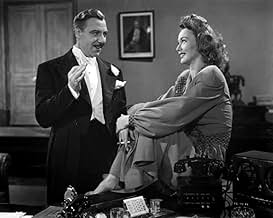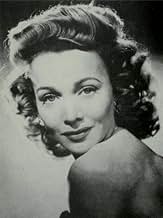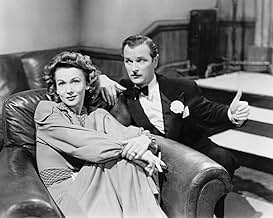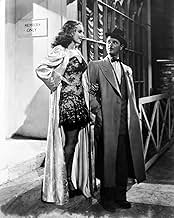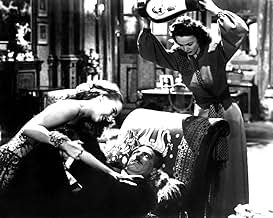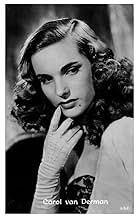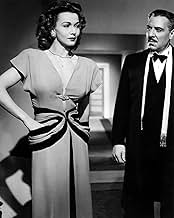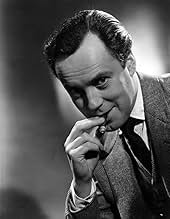In post- WW2 Britain, an American fashion journalist, her ex-army fiancé, and a gang of honest toughs from a local gym attempt to bring black market organized crime to justice.In post- WW2 Britain, an American fashion journalist, her ex-army fiancé, and a gang of honest toughs from a local gym attempt to bring black market organized crime to justice.In post- WW2 Britain, an American fashion journalist, her ex-army fiancé, and a gang of honest toughs from a local gym attempt to bring black market organized crime to justice.
Carol van Derman
- Mercia Lane
- (as Carol Van Derman)
Featured reviews
The Silk Noose, or Noose, as it is also known, from 1948 is a British film starring Carole Landis as a fashion writer for a newspaper.
It's post-war Britain, and despite the war being over, there are many items that are hard to get. An Italian black market racketeer, Sugiani (Calleia) runs an operation in black market goods. So far, the police haven't been able to get them.
A fashion writer, Linda Medbury (Landis), is determined to bring down the gang, although her publisher would rather she stick to clothes. The front for the group, The Blue Moon Club, winds up with a corpse, which sends Linda's reporter tentacles high.
Linda finds herself in danger as does her source. Her fiance is determined to protect her and bring down Sugiani at the same time. It won't be easy.
Sometimes this film seemed like a comedy, particularly with the rapid fire dialogue of Nigel Patrick as a cohort of Sugiani's, and a woman losing her dress toward the end of the film. The last twenty or so minutes has a lot of action.
This was the beautiful Landis' second-last film. What a waste of talent. She gives a vivacious, likeable performance here. Unfortunately, her career fell on hard times when she ended her relationship with Darryl F. Zanuck. Unhappy with her career and misguided in her search for love, she committed suicide. Life in Hollywood for a woman was always extremely difficult, and she was one of its victims.
It's post-war Britain, and despite the war being over, there are many items that are hard to get. An Italian black market racketeer, Sugiani (Calleia) runs an operation in black market goods. So far, the police haven't been able to get them.
A fashion writer, Linda Medbury (Landis), is determined to bring down the gang, although her publisher would rather she stick to clothes. The front for the group, The Blue Moon Club, winds up with a corpse, which sends Linda's reporter tentacles high.
Linda finds herself in danger as does her source. Her fiance is determined to protect her and bring down Sugiani at the same time. It won't be easy.
Sometimes this film seemed like a comedy, particularly with the rapid fire dialogue of Nigel Patrick as a cohort of Sugiani's, and a woman losing her dress toward the end of the film. The last twenty or so minutes has a lot of action.
This was the beautiful Landis' second-last film. What a waste of talent. She gives a vivacious, likeable performance here. Unfortunately, her career fell on hard times when she ended her relationship with Darryl F. Zanuck. Unhappy with her career and misguided in her search for love, she committed suicide. Life in Hollywood for a woman was always extremely difficult, and she was one of its victims.
NOOSE is a well-plotted but oddly uninspiring little crime film which deals with efforts to bring down an Italian black market racketeer operating in London following WW2. His sheer breadth of power means that the authorities are powerless against him, until a lone female reporter decides to write a scoop that brings him out of the woodwork and up against her.
There's some great material in the narrative here, including a completely amoral villain who enjoys using knuckle dusters to beat up women! The stark gang violence makes ahead of its time, but it's a pity that the execution is less than stellar. The film plods when it should grip, and it only really gets going in the last twenty minutes or so, with an unusual and rather powerful climax. It's one of those rare films where the women are both empowered and sexualised, leaving the men looking weak by comparison.
The tragic Carole Landis stars in her penultimate acting role before her untimely suicide and very good she is too: bright, brassy, and running rings around the menfolk. Joseph Calleia and Derek Farr are rather uninspired as the rival protagonists, though we do get the likes of Stanley Holloway in support, and even a brief cameo for Michael Ripper. Nigel Patrick is something of a scene stealer as a loud-mouth spiv, and although his telephone manner is absolutely hilarious, I found his brash character ended up being too over the top for his own good.
There's some great material in the narrative here, including a completely amoral villain who enjoys using knuckle dusters to beat up women! The stark gang violence makes ahead of its time, but it's a pity that the execution is less than stellar. The film plods when it should grip, and it only really gets going in the last twenty minutes or so, with an unusual and rather powerful climax. It's one of those rare films where the women are both empowered and sexualised, leaving the men looking weak by comparison.
The tragic Carole Landis stars in her penultimate acting role before her untimely suicide and very good she is too: bright, brassy, and running rings around the menfolk. Joseph Calleia and Derek Farr are rather uninspired as the rival protagonists, though we do get the likes of Stanley Holloway in support, and even a brief cameo for Michael Ripper. Nigel Patrick is something of a scene stealer as a loud-mouth spiv, and although his telephone manner is absolutely hilarious, I found his brash character ended up being too over the top for his own good.
Edmond Greville brought a gallic sensibility to this vivid evocation of the postwar days when Soho was a byword for criminality and vice, fluidly photographed by Hone Glendinning and ending in a slam-bang finale.
Obligatory American imports Joseph Calleia and Carole Landis both give excellent accounts of themselves as "the nastiest thug in Europe" and his nemesis "the best fashion editor in the business". A uniformly memorable supporting cast include Nigel Patrick in full-on spiv mode, John Salew as Patrick's perspiring courier rejoicing in the name 'Greasy', and Hay Petrie in his creepiest role since he played Quilp as a murderous henchman known only as 'The Barber'.
Obligatory American imports Joseph Calleia and Carole Landis both give excellent accounts of themselves as "the nastiest thug in Europe" and his nemesis "the best fashion editor in the business". A uniformly memorable supporting cast include Nigel Patrick in full-on spiv mode, John Salew as Patrick's perspiring courier rejoicing in the name 'Greasy', and Hay Petrie in his creepiest role since he played Quilp as a murderous henchman known only as 'The Barber'.
American journalist Linda Medbury may be on the staff of a London newspaper to cover the fashion column but this is not going to stop her covering other stories that she comes across. However when she gets onto the extensive racket run by Sugiani, nobody can convince her of the plain and simple fate that has come to anyone who has gone toe-to-toe with his operation. So while Linda continues to work to expose Sugiani for who he is, her military boyfriend Captain "Jumbo" Hyde gathers many men as he can from his associates to protect her in place of a police force defeated before they begin by corruption.
This summer the BBC delivered a season of British films and, to their credit it was not the usual parade of Dam Busters, Zulu and other Bank Holiday favourites but rather an interesting mix of films that are rarely seen. With 26 votes to its name on this site, it is perhaps fair to say that The Noose was one of these. The style of the film is a bit mixed. At times it appears to be every inch a British version of the American gangster film but then at others it is more of a comedy with cheeky chappy clichés kicking around in the shadows. As a result it doesn't totally hang together and I found myself distracted and my interest broken up by the inconsistent tone.
However it is still of interest and does have scenes of value. We do get moments that are easily comparable with the strongest from American noir and we do get amusing characters that remind us where we are but again, these things seem to be working against one another. Gréville's direction is good in regards working with his cinematographer but in terms of solving the issues over the narrative flow, he cannot. Nor can the cast either, and many of them seem to be in different films unfortunately. Landis is enjoyable in the lead she has what the experts would call "spunk" and it brought a bit of spark to the film. Farr is no more than serviceable and sadly the film sags when he is the focus. Calleia is a solid villain but the problem is that he isn't playing it straight and tough and he has an air of flamboyance about him. There is nothing wrong with him in this regard it is just that, within this film it is Nigel Patrick that dominates that sort of area with a wonderfully comic caricature that he works well.
An interesting film to see then for its attempts to do what it does within a British context but it is the inability to either hold a consistent tone or blend the different ones successfully that sees it be a lesser film than I would have hoped. I would have liked to be able to praise it on account of it being obscure and thus me looking cool but as it is it is interesting but not all that great.
This summer the BBC delivered a season of British films and, to their credit it was not the usual parade of Dam Busters, Zulu and other Bank Holiday favourites but rather an interesting mix of films that are rarely seen. With 26 votes to its name on this site, it is perhaps fair to say that The Noose was one of these. The style of the film is a bit mixed. At times it appears to be every inch a British version of the American gangster film but then at others it is more of a comedy with cheeky chappy clichés kicking around in the shadows. As a result it doesn't totally hang together and I found myself distracted and my interest broken up by the inconsistent tone.
However it is still of interest and does have scenes of value. We do get moments that are easily comparable with the strongest from American noir and we do get amusing characters that remind us where we are but again, these things seem to be working against one another. Gréville's direction is good in regards working with his cinematographer but in terms of solving the issues over the narrative flow, he cannot. Nor can the cast either, and many of them seem to be in different films unfortunately. Landis is enjoyable in the lead she has what the experts would call "spunk" and it brought a bit of spark to the film. Farr is no more than serviceable and sadly the film sags when he is the focus. Calleia is a solid villain but the problem is that he isn't playing it straight and tough and he has an air of flamboyance about him. There is nothing wrong with him in this regard it is just that, within this film it is Nigel Patrick that dominates that sort of area with a wonderfully comic caricature that he works well.
An interesting film to see then for its attempts to do what it does within a British context but it is the inability to either hold a consistent tone or blend the different ones successfully that sees it be a lesser film than I would have hoped. I would have liked to be able to praise it on account of it being obscure and thus me looking cool but as it is it is interesting but not all that great.
Tangy post-War British 'Spiv' movie (a cycle of films with roots in 30s American Gangster movies, featuring characters profiting from wartime rationing in a similar fashion to 30s bootleggers, but not so clearly glamorised as their Stateside equivalents). Directed by Edmond T. Greville (BEAT GIRL aka WILD FOR KICKS), and adapted from a stage play, this features Carole Landis (in one of her final roles) as nosy reporter Linda Medbury who, together with her ex-commando boyfriend Jumbo Hoyle (played by Derek Farr), gets on the trail of a gang of post-war black marketeers headed by Soho nightclub owner Sugiani, played by Joseph Calleia (whose role was based on a real-life Post-war London criminal). This gets them mixed up with London 'Spiv' Bar Gorman, played by Nigel Patrick, whose slangy, comic performance almost overshadows the surrounding film. Imaginatively shot, speedily paced, and ripe with post-War vernacular and the requisite criminal dust-ups (primarily involving the good guys' recruited gang of boxers, market porters, and cab drivers versus the low-life criminals), this is an entertaining slice of British crime and deserves to be better known, as it's worthy of a place alongside such noted post-War British crime movies as BRIGHTON ROCK and NIGHT AND THE CITY. Check it out, if you get the chance.
Did you know
- Trivia"Noose" was filmed in England during January and February of 1948. This was the final movie Carole Landis made before her death.
- ConnectionsFeatured in Voyage à travers le cinéma français (2016)
- SoundtracksWhen Love Has Passed You By
Composed by Edward Dryhurst
Lyrics by Barry Gray and Jean Cavall
Performed by Olive Lucius (uncredited)
Details
- Release date
- Country of origin
- Languages
- Also known as
- The Silk Noose
- Filming locations
- Warner Brothers First National Studios, Teddington Studios, Teddington, Middlesex, England, UK(studio: made at Warner Bros. First National Studios, Teddington, England.)
- Production companies
- See more company credits at IMDbPro
- Runtime
- 1h 16m(76 min)
- Color
- Aspect ratio
- 1.37 : 1
Contribute to this page
Suggest an edit or add missing content

